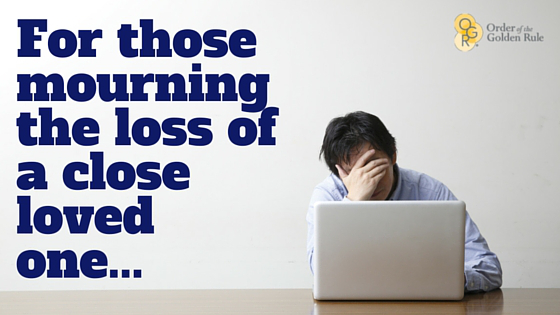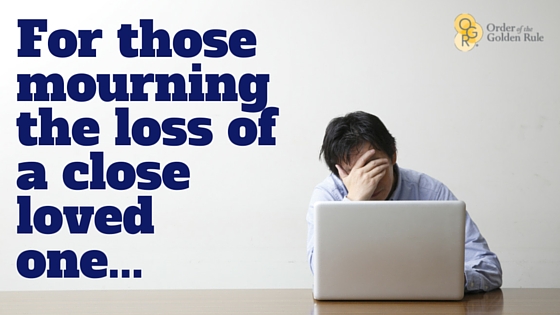Grieving Online – No Apologies Needed
Guest article provided by: OGR – Order of the Golden Rule
Everyone has those Facebook friends who overshare every aspect of their lives – from what they had for breakfast that morning to their thoughts on last night’s political debate. It’s easy to grow weary of those who overshare.

There’s an etiquette that’s slowly developed around being a good online friend (read more 14 Do’s and Don’ts;Essential Facebook Etiquette) and approaching online interactions with care, but the lines are still blurred when someone has experienced loss.
What happens when it comes to grief? Do the rules for social niceties apply when someone has lost a loved one? What about for those on the other side, on the receiving end of grief posts? How should they respond?
Here are a couple considerations for when it comes to grieving online.
1. Recognize that everyone grieves differently.
In spite of what people may say, grief, which is “a natural response to the loss of someone or something very dear to us“, is a highly individual and personal experience. It interrupts the rhythm of life and rips any sense of normalcy from families. Whether the death is expected or sudden, nothing prepares those left behind for the loss of a family member or a close loved one. Take a deep breath and allow yourself to grieve in a way that’s appropriate for you, especially if it’s online. (If you’re not immediate family or extremely close to the deceased, see our tips below before expressing grief online.)
2. Don’t apologize for grieving publicly.
In Jewish tradition, men and women tear their garments and weep over death. In Taiwan, China, and the UK, families can hire professional mourners who cry on demand at the wake or funeral. People have written books, penned songs, and made movies regarding loss, so it’s no surprise that we turn to social media to express grief. Social media spans space and time and has become just another forum for mourning. If using this space to express your grief suits you, don’t apologize.
One blogger acknowledges her difficulty with using social media for grieving.
I feel constantly like apologizing to my Facebook feed for the steady outpouring of sadness and memory. “CS Lewis wrote an entire book (‘A Grief Observed’) about his wife,” I reason. “Let me write about my mom for a few weeks”—to which artist Isobel Francisco replies, “You don’t have to apologize for your grief (or your love).”
3. Use online grief resources.
With the advent of the Internet, there are countless ways to connect with others who are mourning. Check out this site for over a hundred helpful websites for grieving, and recognize you’re not alone in this process.
4. Give yourself space and time.
Be kind to yourself. Healing occurs gradually. There are no set rules for how and when the process takes place. If healing can take place for you in the online space, take advantage of it.
1. Don’t be the first to post condolences publicly on social media.
Wait for the family and closest loved ones to do so. Privately message the family or give them a phone call to express your condolences if you want to reach out, but give the family space to express their grief first. Recognize that social media posts may be a lifeline for those who live out of town and can’t be near the family during the loss, so let the family determine how they want to approach the online space. You don’t want to be that friend who alerts all of social media of someone’s death if the family hasn’t yet had a chance to inform the people they need to.
2. Don’t judge how someone chooses to grieve.
There are some who post photos with the deceased, others who pour out their hearts in status updates, and others who leave social media altogether to mourn. Recognize that grief impacts everyone differently and give grace for how and when that person chooses to express his/her pain – even if it’s several times a day over a long period of time.
3. Join the conversation once someone has acknowledged loss online. Social media can actually benefit those who are grieving. Professor Garry Hare of Fielding Graduate University, praises social media for its work in placing the grieving process “within the context of a community that comes together and says you are not alone.” Garry goes on to say that social media helps those who don’t feel equipped to express their condolences in a way that can still be meaningful.
“In the old days, you had to go knock on your neighbor’s door when something was wrong. But not very many of us did it because we didn’t know what to say. We were just not equipped… Now, the distance provided by social media is extraordinarily safer and that doesn’t make it less meaningful.”
Don’t hesitate to reach out once someone has started posting online. You’re participating in a powerful community.
Whether you’re grieving the loss of a loved one online or observing those in mourning on social media, be gracious. Grief can be overwhelming, and we need each other more than ever when experiencing a loss. We’ll leave you with this final thought:

“Grief is like the ocean; it comes in waves ebbing and flowing. Sometimes the water is calm, and sometimes it is overwhelming. All we can do is learn to swim.” ~Vicki Harrison
Let’s help each other swim.






